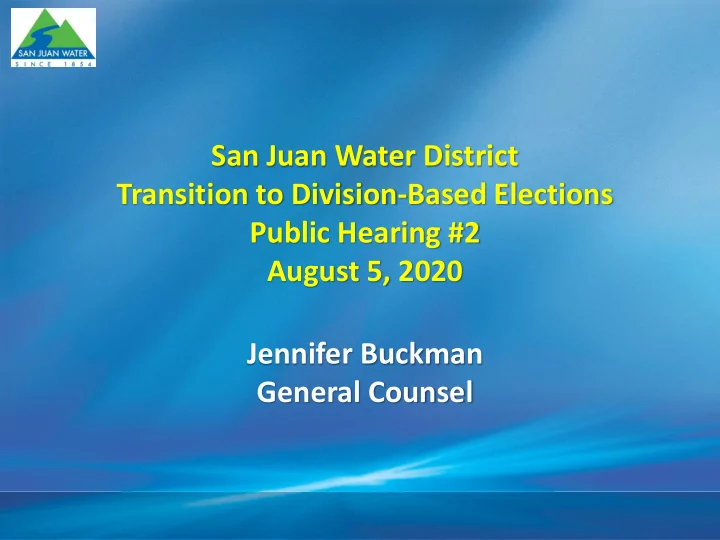

San Juan Water District Transition to Division-Based Elections Public Hearing #2 August 5, 2020 Jennifer Buckman General Counsel
SJWD Service Area
Process to Date March 30 CVRA letter – potential legal challenge May 13 SJWD Board decision – use safe harbor process (180 days) Prior proceedings – June 10, July 8 1 st Hearing – August 3 Tonight’s Hearing – 2 nd of 2 initial hearings Take input from public on factors Input used to shape draft maps Maps presented at subsequent hearings
Electoral Processes Existing (1954-2020) – “At - large” – voters throughout SJWD elect 5 Board members, on staggered terms New (2022 and beyond) – “By - division” The SJWD service area will be divided into 5 voting divisions Each division will elect one director Only the voters in that division will be able to vote for the director that will represent the division
Mapping the Divisions To transition to division-based elections, SJWD will need to define the 5 voting divisions A map will be drawn showing the location of each division This is a public process and SJWD will be taking the input of the community as it develops and refines the maps, consistent with applicable the legal standards
Rules and Other Factors for Divisions Legal Considerations in Drawing Electoral Divisions: Reasonably Equal Populations (average +/- 10%) Contiguous Divisions No Racial Gerrymandering Respect Communities of Interest Compact Divisions
Applying the Factors to Create Divisions Paramount Legal Principles: Reasonably Equal Populations (average +/- 10%) – this criterion is imposed by federal law and must be respected Avoid Diluting Votes of Racial, Ethnic & Language Minority Voting Groups Avoid “packing” – when a community could be 55% of 2 different divisions but are concentrated into a supermajority in 1 division Avoid “cracking” – fragmenting concentrations of minority voters among multiple districts
Applying the Factors to Create Divisions Paramount Legal Principles: Contiguity No islands or donuts Perimeter = one unbroken line Compactness – “reasonable” standard
Applying the Factors to Create Divisions Other Legal Principles: Compactness – “reasonable” standard Respect for “Communities of Interest”
Applying the Factors to Create Divisions Communities of Interest Most “enigmatic” of the traditional districting principles The community group should have “ actual shared interests .” Miller , 515 U.S. at 916. "Residents of political units such as townships, cities, and counties often develop a community of interest, particularly when the subdivision plays an important role in the provision of governmental services." Karcher , 462 U.S. at 758 (Stevens, J., concurring)
Applying the Factors to Create Divisions Communities of Interest Other political subdivisions, shared cultural or economic interests may also qualify Should be kept intact if feasible, given application of other factors. Bush v. Vera , 517 U.S. at 977. Often not possible to respect all political subdivision borders and also comply with “reasonably equal population” Board determines what the relevant communities of interest are, after taking public input
Demographic Summary 2010 Census Figures Category Total Population Each Board African-American 3,021 Member District Would Asian-American 5,801 Contain Approximately Latino 17,770 30,100 White 117,316 Residents, Other 6,587 +/- 10% Total 150,499
Concentrations of African-American Residents
Concentrations of Asian-American Residents
Concentrations of Latino Residents
Census Block Groups Population Numbers Image is available on sjwd.org
Next Steps Step Description Informational Sessions Public Outreach. June 10 & July 8 Two Initial Hearings Held prior to release of draft maps. August 3 & August 5 Opportunity for public to learn and provide input. Release Draft Maps Maps must be released by September 2. Two Hearings on Draft Two meetings to discuss and revise draft maps. Maps Sept. 9 & Oct. 14 Final Adoption of Map Second reading of ordinance and approval of map. November 9 Update Map Based on Make any revisions that might be necessary, based 2020 Census Data on new census data. November 2022 Election for first three new division seats. November 2024 Election of remaining two division seats.
More Information Transitioning to Division-Based Elections Website: https://www.sjwd.org/transitioning-to-division-based-elections Comments: comments@sjwd.org
Recommend
More recommend